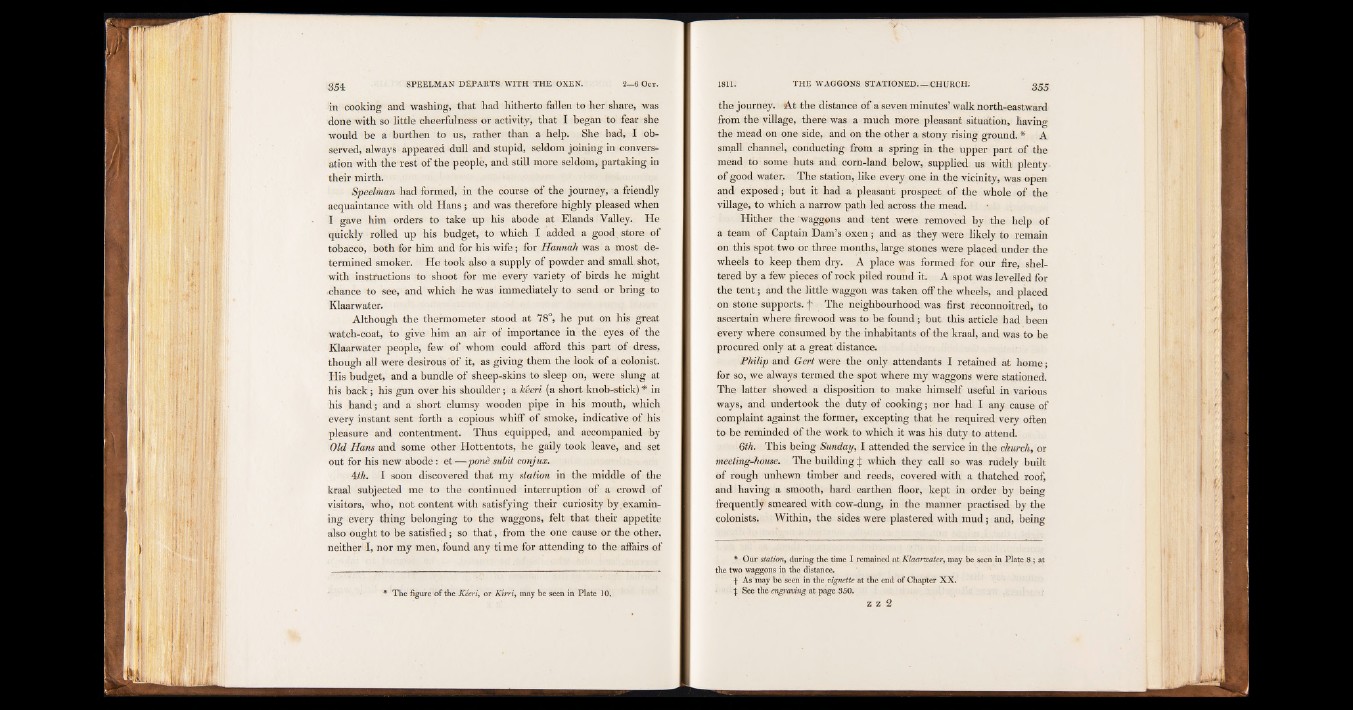
in cooking and washing, that had hitherto fallen to her share, was
done with so little cheerfulness or activity, that I began to fear she
would be a burthen to us, rather than a help. She had, I observed,
always appeared dull and stupid, seldom joining in conversation
with the rest of the people, and still more seldom, partaking in
their mirth.
Speelman had formed, in the course of the journey, a friendly
acquaintance with old Hans; and was therefore highly pleased when
I gave him orders to take up his abode at Elands Valley. He
quickly rolled up his budget, to which I added a good, store of
tobacco, both for him and for his wife; for Hannah was a most determined
smoker. He took also a supply of powder and small shot,
with instructions to shoot for me every variety of birds he might
.chance to see, and which he was immediately to send or bring to
Klaarwater.
Although the thermometer stood at 78°, he put on his great
watch-coat, to give him an air of importance in the eyes of the
Klaarwater people, few of whom could afford this part of dress,
though all were desirous of it, as giving them the look of a colonist.
His budget, and a bundle of sheep-skins to sleep on, were slung at
his back; his gun over his shoulder; a keen (a short knob-stick) * in
his hand; and a short clumsy wooden pipe in his mouth, which
every instant sent forth a copious whiff of smoke, indicative of his
pleasure and contentment. Thus equipped, and accompanied by
Old Hans and some other Hottentots, he gaily took leave, and set
out for his new abode: e t—pone mbit conjux.
\th. I soon discovered that my station in the middle of the
kraal subjected me to the continued interruption of a crowd of
visitors, who, not content with satisfying their curiosity by examining
every thing belonging to the waggons, felt that their appetite
also ought to be satisfied; so that, from the one cause or the other,
neither I, nor my men, found any ti me for attending to the affairs of
* The figure of the Kieri, or Ktrri, may be seen in Plate 10.
the journey. At the distance of a seven minutes’ walk north-eastward
from the village, there was a much more pleasant situation, having
the mead on one side, and on the other a stony rising ground. * A
small channel, conducting from a spring in the upper part of the
mead to some huts and corn-land below, supplied us with plenty
of good water. The station, like every one in the vicinity, was open
and exposed; but it had a pleasant prospect of the whole of the
village, to which a narrow path led across the mead.
Hither the waggons and tent were removed by the help of
a team of Captain Dam’s oxen; and as they were likely to remain
on this spot two or three months, large stones were placed under the
wheels to keep them dry. A place was formed for our fire, sheltered
by a few pieces of rock piled round it. A spot was levelled for
the ten t; and the little waggon was taken off the wheels, and placed
on stone supports, f The neighbourhood was first reconnoitred, to
ascertain where firewood was to be found; but this article had been
every where consumed by the inhabitants of the kraal, and was to be
procured only at a great distance.
Philip and Gert were the only attendants I retained at home;
for so, we always termed the spot where my waggons were stationed.
The latter showed a disposition to make himself useful in various
ways, and undertook the duty of cooking; nor had I any cause of
complaint against the former, excepting that he required very often
to be reminded of the work to which it was his duty to attend.
6th. This being Sunday, I attended the service in the church, or
meeting-home. The building J which they call so was rudely built
of rough unhewn timber and reeds, covered with a thatched roof,
and having a smooth, hard earthen floor, kept in order by being
frequently smeared with cow-dung, in the manner practised by the
colonists. Within, the sides were plastered with mud; and, being
* Our station, during the time I remained at Klaai'water, may be seen in Plate 8 ; at
the two waggons in the distance.
f As may be seen in the vignette at the end of Chapter XX.
% See the engraving at page 850.